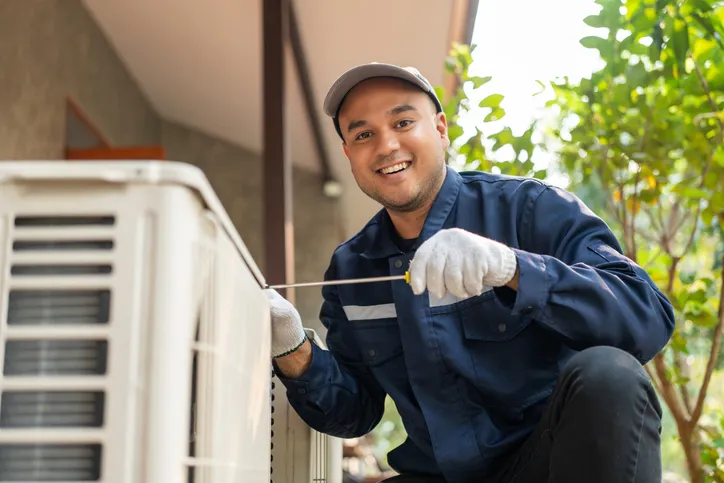Garage Heating & Air Conditioning in Pendergrass, GA
Res Air LLC delivers reliable garage heating & cooling services in Pendergrass, GA. Keep your space comfortable by booking your HVAC service with us today!
Converting an unconditioned garage into a comfortable, year-round space requires more than just a space heater or window AC. In Pendergrass, GA, where summers are hot and humid and winter nights can dip below freezing, a properly designed garage heating and air conditioning solution improves comfort, protects tools and vehicles, and prevents moisture and mold. This page explains how professionals assess your garage, recommended equipment choices, installation steps, ventilation and safety requirements, energy-efficiency strategies, and maintenance plans tailored to homes in Pendergrass, GA.
Why condition a garage in Pendergrass, GA
- Summers in northeast Georgia bring high humidity and heat. Unconditioned garages often trap moisture, leading to condensation on metal surfaces, rust on tools, and mildew on stored items.
- Winters may be mild overall, but occasional freezes and cold nights can damage temperature-sensitive materials, cause frozen plumbing in attached garages, and make workspaces unusable.
- Conditioning a garage makes it usable as a workshop, hobby area, home gym, or insulated buffer for the house, improving overall home comfort and protecting investments.

Common garage HVAC issues in Pendergrass, GA
- Poor insulation and air leakage through garage doors and seams.
- Excess humidity and condensation during summer months.
- Inefficient or unsafe portable heaters that increase risk of fire or carbon monoxide.
- Insufficient electrical capacity for modern HVAC equipment in older garages.
- Lack of proper ventilation for vehicle exhaust and stored chemicals.
Typical assessment: what a professional checks
A proper garage heating and air conditioning assessment includes:
- Measuring square footage, ceiling height, and garage door area to calculate heating and cooling load.
- Inspecting insulation in walls, ceiling, garage door, and identifying air leaks around doors, windows, and seams.
- Checking slab condition and presence of vapor barrier to evaluate moisture transfer.
- Confirming electrical service and available breaker capacity for proposed equipment.
- Determining whether the garage is attached or detached, and whether it shares ducts with the home.
- Evaluating ventilation needs for fumes and combustion appliances and checking local code and permit requirements.
Recommended equipment options
Choosing the right system depends on use, budget, and whether you want year-round conditioning or intermittent climate control.
- Ductless mini-split heat pumps
- Pros: Highly efficient, provide both cooling and heating, no ductwork required, quick installation, excellent for zoned temperature control.
- Best for: Detached garages, workshops, or when you want precise control and energy efficiency.
- Packaged units or through-the-wall heat pumps
- Pros: All-in-one indoor/outdoor solution, space saving, suitable when wall penetrations are practical.
- Best for: Attached garages where minimal interior modification is preferred.
- Electric unit heaters
- Pros: Low upfront cost, simple installation, no combustion gases.
- Cons: Higher operating cost in prolonged cold periods.
- Best for: Occasional heating or supplemental heat in well-insulated garages.
- Gas-fired unit heaters
- Pros: Strong heat output and lower operating cost where natural gas is available.
- Safety: Require proper venting, combustion air, and clearance from combustibles.
- Best for: Large garages with heavy-duty heating needs and proper venting infrastructure.
- Extending home ductwork or packaged rooftop units
- Pros: Can centralize systems, but may reduce overall home efficiency if not properly balanced.
- Considerations: Ducts must be insulated and sized properly to avoid pressure and humidity problems.
Installation process overview
- Pre-installation assessment and load calculation.
- Seal and insulate: add insulation to walls, ceiling, and garage door; weatherstrip gaps.
- Prepare electrical and fuel lines as needed, applying code-compliant work and permits.
- Install equipment: mount mini-split indoor/outdoor units or place packaged units; install ducting if used.
- Configure ventilation: add exhaust fans, make-up air, and CO detection if combustion equipment is used.
- Commissioning: test system performance, refrigerant charge, airflow, thermostat calibration, and safety interlocks.
- Customer walk-through on operation and basic maintenance tasks.
Ventilation and safety considerations
- Carbon monoxide and combustion safety: Any gas-fired heater requires proper venting and combustion air. Install CO detectors outside garage and at house entries when the garage is attached.
- Fume control: For garages used with vehicles or painting, provide controlled ventilation such as timered exhaust fans and make-up air to clear fumes.
- Fire and storage: Maintain required clearances around unit heaters and avoid storing flammable materials near heating equipment.
- Electrical safety: Ensure outlets and circuits meet the load; use GFCI outlets where code requires.
- Permits and codes: Local building codes in Jackson County may require permits for HVAC modifications, especially for gas or electrical upgrades.
Energy-efficiency tips for Pendergrass garages
- Insulate garage door and replace weatherstripping to reduce heat gain and loss.
- Use a heat pump mini-split for both efficient cooling and heating; modern units have good performance in mild Georgia winters.
- Zone the garage separately with its own thermostat or use a programmable schedule or occupancy sensor to avoid conditioning the space when not in use.
- Add a dedicated dehumidifier or choose a heat pump with strong dehumidification to control summer humidity and prevent condensation.
- Seal slab edges and add a vapor barrier if moisture intrusion is present.
- Consider ceiling fans or high-velocity fans to even out temperature and reduce runtime.
Maintenance plans to keep your garage comfortable year-round
A simple maintenance plan extends equipment life and ensures reliable comfort:
- Biannual HVAC tune-ups: check refrigerant, clean coils, confirm electrical connections, inspect blowers and belts.
- Quarterly filter checks and replacement for mini-splits and packaged units.
- Annual inspection of combustion appliances: venting, pilot or ignition systems, and CO detector testing.
- Condensate drain cleaning to prevent backups and mold growth.
- Inspect seals, garage door insulation, and weatherstripping each season to maintain efficiency.
Benefits of a conditioned garage
A properly designed garage heating and air conditioning system in Pendergrass, GA provides:
- Comfortable, usable space year-round for projects, storage, and hobbies.
- Protection for vehicles, tools, and stored items from humidity and temperature swings.
- Reduced risk of mold, corrosion, and damage to temperature-sensitive materials.
- Energy savings when systems are sized and installed correctly and paired with insulation and zoning.
Conditioning your garage is an investment in comfort, functionality, and the longevity of your belongings. With the right assessment, equipment, ventilation, and routine maintenance, a garage in Pendergrass, GA can become a reliable, efficient space throughout the seasons.
Take the Next Step Toward Year-Round Comfort
Don’t let your garage go unused or expose your tools and vehicles to damage from extreme temperatures and humidity. With a professionally designed garage heating and air conditioning system, you can enjoy a safe, comfortable, and functional space every day of the year. Res Air LLC is here to help homeowners in Pendergrass, GA, transform their garages with customized solutions, expert installation, and reliable maintenance.
Call Res Air LLC today to schedule your garage HVAC consultation and start maximizing your home’s comfort and value.


Financing
We make comfort affordable with flexible financing options through Optimus and Synchrony, giving you stress-free payment solutions for your HVAC needs.


Customer Testimonials
At Res Air, our customers’ satisfaction speaks louder than words. From fast emergency repairs to flawless system installations, homeowners trust us for reliable comfort and professional service.


.png)
.jpg)
